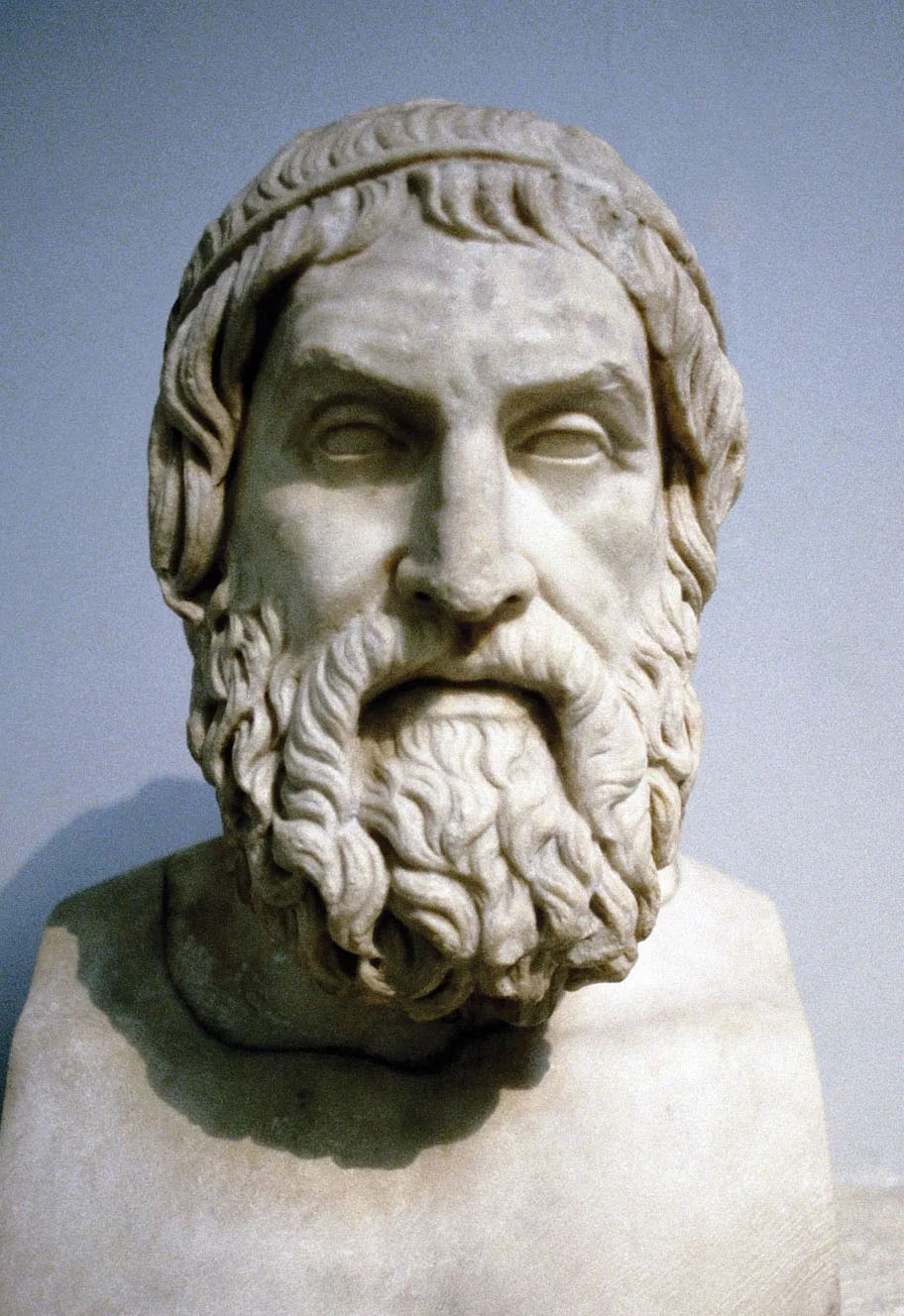Sophocles
Born:
C. 496 BCE
Died:
C. 406 BCE
Sophocles was an ancient Greek playwright and one of the three great tragedians of classical Athens, alongside Aeschylus and Euripides. He is best known for his dramatic works, particularly his tragedies, which include timeless masterpieces like "Oedipus Rex," "Antigone," and "Electra." Sophocles played a crucial role in the development of ancient Greek theatre and made significant contributions to the art of tragedy. Here are key aspects of Sophocles's life and works:
Early Life: Sophocles was born in Colonus, a suburb of Athens, around 496 BCE. He came from a prosperous and well-connected family, and his father, Sophilus, was a wealthy armour manufacturer.
Theatre and Dramatic Competitions: Sophocles participated in the dramatic competitions held during the festivals of Dionysus in Athens. He wrote over 120 plays, although only seven tragedies have survived in their entirety.
Innovations in Tragedy: Sophocles is credited with introducing several innovations to Greek tragedy. He increased the number of actors from two to three, reduced the role of the chorus, and introduced painted scenery, contributing to a more dynamic and theatrical experience.
Theban Plays: Sophocles wrote a series of three plays related to the mythical royal family of Thebes. This trilogy consists of "Oedipus Rex," "Antigone," and "Oedipus at Colonus." While these plays were not originally performed together, they are often studied and performed as a trilogy.
"Oedipus Rex" (Oedipus the King): One of Sophocles's most famous works, "Oedipus Rex," explores the tragic fate of Oedipus, who unwittingly fulfills a prophecy that he will kill his father and marry his mother. The play delves into themes of fate, free will, and the consequences of human actions.
"Antigone": "Antigone" is another renowned play by Sophocles, depicting the conflict between the individual's moral duty and the laws of the state. The play revolves around Antigone's defiance of King Creon's decree prohibiting the burial of her brother, leading to tragic consequences.
"Electra": "Electra" is one of Sophocles's works that focuses on the character of Electra, daughter of King Agamemnon. The play explores themes of vengeance, justice, and familial relationships.
Philosophical Themes: Sophocles's tragedies often grapple with profound philosophical and ethical questions, addressing issues such as the nature of justice, the consequences of hubris (excessive pride), and the interplay between fate and free will.
Political and Civic Roles: Sophocles was involved in Athenian civic life, holding various public offices. He served as a general, participated in diplomatic missions, and held the prestigious position of treasurer of the Delian League.
Death: Sophocles lived into his nineties and died around 406 BCE. His death is said to have occurred shortly after a victory in his play "Oedipus at Colonus" in a dramatic competition.

Quick Facts
- Sophocles wrote over 120 plays, although only seven tragedies have survived in their entirety.
- He increased the number of actors from two to three in Greek tragedy, reducing the role of the chorus.
- Sophocles introduced painted scenery to enhance the theatrical experience.
- His Theban Plays trilogy consists of "Oedipus Rex," "Antigone," and "Oedipus at Colonus."
- Sophocles's philosophical themes in his tragedies explore justice, hubris, and the interplay between fate and free will.
Further Reading
Art &
Architecture
Ancient Greek art and architecture, with its harmonious proportions and timeless elegance, continue to inspire awe and admiration millennia later.
Discover
Greek Mythology & Mythical Characters
Greek mythology, a rich tapestry of gods, heroes, and mythical creatures, captivates the imagination with its tales of love, betrayal, and epic adventures that delve into the depths of the human psyche.
Discover
Ancient Greek History
Ancient Greek history, marked by remarkable achievements in democracy, philosophy, and warfare, shaped the foundation of Western civilization, leaving an indelible legacy of innovation and cultural influence that continues to resonate to this day.
Discover
Ancient Greek Olympics
The ancient Greek Olympics, held in Olympia every four years, celebrated athleticism, unity, and cultural pride, serving as a testament to the enduring spirit of competition and excellence that transcends time and borders.
Discover
Ancient Greek Wars
Ancient Greek wars, such as the Persian Wars and the Peloponnesian War, were pivotal conflicts that shaped the course of history, highlighting the struggle for power, independence, and the clash of civilizations in the ancient Mediterranean world.
Discover
Ancient Greek Culture and Society
Ancient Greek culture and society, characterized by its emphasis on art, philosophy, and civic engagement, fostered a vibrant intellectual and social landscape where innovation flourished, democracy thrived, and the pursuit of knowledge and excellence was celebrated as fundamental values of civilized life.
Discover